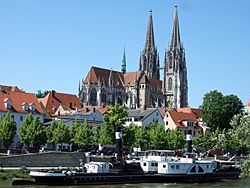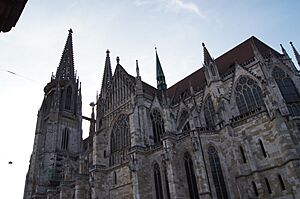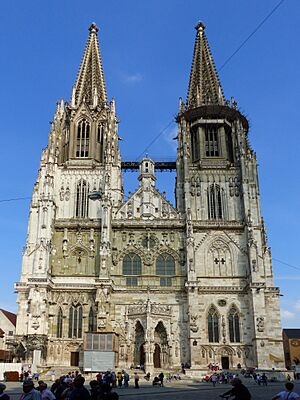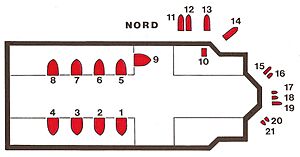Regensburg Cathedral facts for kids
Quick facts for kids Saint Peter's Cathedral |
|
|---|---|
|
Regensburger Dom
|
|

Regensburg Cathedral, in the foreground the Danube.
|
|
| 49°01′10″N 12°05′54″E / 49.01944°N 12.09833°E | |
| Location | Regensburg |
| Country | Germany |
| Denomination | Roman Catholic |
| Website | Website |
| History | |
| Status | Active |
| Architecture | |
| Functional status | Cathedral |
| Completed | 1520 |
| Specifications | |
| Length | 85.40 m (280 ft 2 in) |
| Width | 34.80 m (114 ft 2 in) |
| Height | 31.85 m (104 ft 6 in) |
| Number of spires | 2 |
| Spire height | 105 m (344 ft 6 in) |
| Administration | |
| Diocese | Diocese of Regensburg |
Regensburg Cathedral, also known as St. Peter's Cathedral, is a very important example of Gothic architecture in Germany. It's a famous landmark in the city of Regensburg and is the main church for the Catholic Diocese of Regensburg.
Contents
History of the Cathedral
Early Beginnings
The first church on this site was called Niedermünster. It was built around the year 700. This early church was a chapel for a royal family. It also served as a tomb for Erhard of Regensburg. Sadly, Niedermünster burned down in 1273. Because Regensburg was doing well financially, a new, grander cathedral could be built.
Building the Gothic Masterpiece
Construction on the new cathedral began around 1280. The main architect had learned his skills in France. This is why the cathedral has many French Gothic features. These include a main hall (called a nave) divided into three parts. It also has strong supports called buttresses and beautiful arched ceilings called vaulting. Two tall towers were planned for the front of the building.
By 1320, three parts of the cathedral, called choirs, were ready to be used. The main entrance on the west side was finished between 1385 and 1415. Most of the building was completed around 1520. This was also the year the cathedral officially opened.
One of the builders, Mathes Roriczer, wrote down how to design the cathedral's parts. He used a special method to figure out the right sizes for things like the tall, pointed pinnacles.
Later Changes and Restoration
In the 1600s, some parts of the cathedral were updated in a Baroque style. This included the dome over the main crossing. During this time, old paintings in the All Saints' Chapel were covered up. They were later uncovered in the 1800s.
Between 1828 and 1841, King Ludwig I of Bavaria ordered a Neo-Gothic renovation. The Baroque dome was removed and replaced with a new arched ceiling. The towers and their tall spires were finished between 1859 and 1869. The entire cathedral was finally completed three years later.
The Dombauhütte (cathedral building workshop) was started in 1923. This group is in charge of taking care of and restoring Regensburg Cathedral. They worked on a big restoration project in the 2000s. In the 1980s, they also built a crypt (an underground burial place) and explored the central nave.
The Cathedral's Design
Regensburg Cathedral is unique because it's separate from an older building called a cloister. This happened when the church was rebuilt in a slightly different spot.
The Eselsturm (or "donkey tower") is an old tower still standing on the north side. It was used to lift building materials to the higher parts of the cathedral. A pulley is still there in the west loft. Materials were lifted through an opening in the ceiling near the main west door.
The Dombauhütte workshop is located east of the cathedral. This workshop keeps the building in good condition. They even make their own tools there, using a mix of old and new methods.
Important Sculptures
Inside the cathedral, you can see two amazing sandstone statues. They are of the Virgin Mary and the Angel Annunciate (Angel Gabriel). These large statues are on pillars near the west crossing. They were made around 1280 by a famous artist known as Erminoldmeister. Mary holds a book and greets the angel.
On the eastern pillars, there are stone figures of Saint Peter and Saint Paul. These were added between 1320 and 1370.
Stained Glass and Altars
The All Saints' Chapel is part of the cathedral's cloister. It was built in 1140 as a burial chapel. Most of the beautiful stained glass windows were put in between 1220 and 1370. The windows on the west side were finished much later, in the 1800s. More modern windows were added in the 1960s by artist Professor Oberberger.
The silver high altar was made by artists from Augsburg between 1695 and 1785. There are also five Gothic Altars of Reservation. A new Altar of Celebration was built in the southern choir in 2004 by Helmut Langhammer.
Importance of Regensburg Cathedral
Regensburg Cathedral is the main church for the Roman Catholic Diocese of Regensburg. It is also home to the famous Regensburger Domspatzen, which is the cathedral's choir. This choir has a very long and rich history. The cathedral is considered the most important Gothic building in southern Germany.
Many important bishops are buried here. These include Johann Michael von Sailer and Georg Michael Wittmann. There is also a bronze memorial for Prince-Bishop Cardinal Philipp Wilhelm in the central nave.
Cathedral Dimensions
| Overall length (inside) | 85.40 m |
| Width (inside) | 34.94 m |
| Height (nave) | 31.85 m |
| Height (bell towers) | 105 m |
Images for kids
See also
 In Spanish: Catedral de Ratisbona para niños
In Spanish: Catedral de Ratisbona para niños
 | Isaac Myers |
 | D. Hamilton Jackson |
 | A. Philip Randolph |







